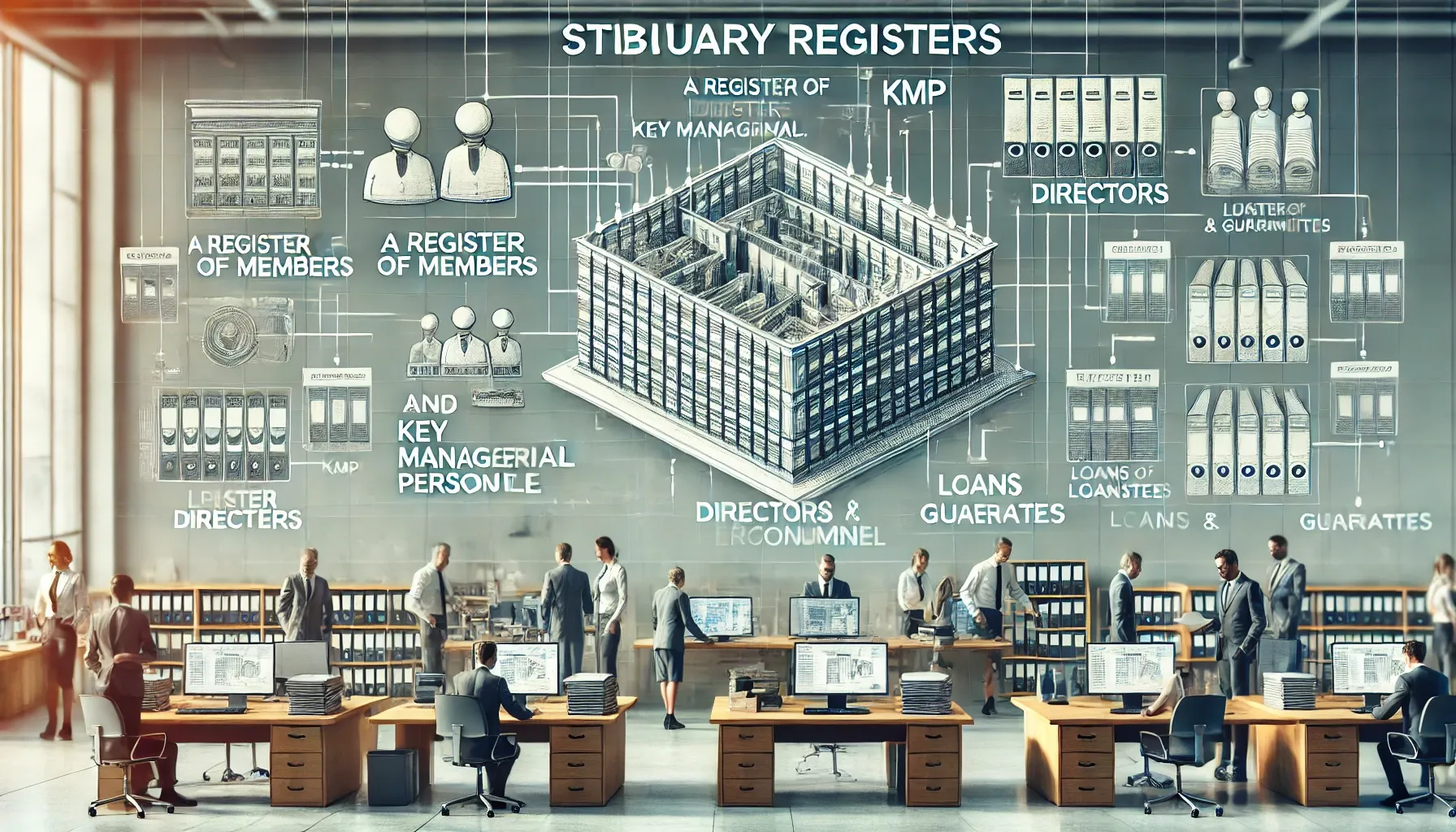Statutory registers under the Companies Act, 2013 are essential for maintaining corporate governance, compliance, and transparency. They track shareholder details, financial records, and important company decisions.

Introduction
Statutory registers are important tools for the corporate governance, compliance, and transparency of a company. They ensure that the company operates within the legal framework, so that it builds confidence among the shareholders and other stakeholders and facilitates smooth business operations. Statutory registers aid to prevent fraud and protect the interests of minority shareholders. However, the maintenance of these registers is not just a legal duty but an essential aspect of fair corporate management. Under the Companies Act, 2013, a company is required by law to maintain these statutory registers in a prescribed manner under this Act. These registers make available a detailed record of the financial statements, members, and important actions or decisions taken by the company. So, these registers are mandatory for every company.
Meaning of Statutory Register
Statutory registers are official records that contain essential information regarding the affairs of the company. These registers strengthen accountability and transparency by providing essential information about several aspects of a business’s transactions, such as minutes of meetings, details of shareholders, directors, etc.
Types of Statutory Registers
Statutory registers play an important role in corporate governance, acting as a complete record-keeping system for companies’ businesses. They are maintained to comply with legal obligations and provide records of the company. Some key types of statutory registers that businesses are required to maintain are as follows:
- Register of Members: According to Section 88 of the Companies Act, 2013 read with Rule 3 and Rule 4 of Companies (Management and Administration) Rules, 2014, every company shall keep and maintain the register separately for each class of shareholders, debenture holders and other security holders within a period of seven days subsequent to allotment or transfer of shares in Forms MGT-1 and MGT-2.
- Register of Sweat Equity Shares: According to Section 54 of the Companies Act, 2013 read with Rule 8(14) of Companies (Share Capital and Debenture) Rules, 2014, companies that has issued sweat equity shares are required to maintain a register, and it includes the date of board and special resolution, name of the holder, and its valuation and lock-in period in Form SH-3.
- Register of Employee Stock Options: According to Section 62(1)(b) of the Companies Act, 2013 read with Rule 12(10) of Companies (Share Capital and Debentures) Rules, 2014, every company that have issued a scheme of employee stock options (ESOP) shall maintain a register and file with the RoC in Form SH-6.
- Register of Securities Buyback: According to Section 68(9) of the Companies Act, 2013, read with Rule 17(12) of Companies (Share Capital and Debentures) Rules, 2014, a company that has done buyback of its shares or securities shall maintain a register in Form SH-10.
- Register of Charges: According to Section 85 of the Companies Act, 2013 read with Rule 10 of Companies (Registration of Charges) Rules, 2014, every company on whose property or assets a charge is created shall keep and maintain the register of charges in Form CHG-7. The register shall be preserved for inspection up to eight years from the date of satisfaction of charges.
- Register of Deposits: According to Section 73, 76, read with Rule 14 of the Companies (Acceptance of Deposits) Rules, 2014, every company that is authorised by its Article of Association to accept deposits can maintain a register of deposits and file it with the RoC within 30 days in Forms DPT-1 and DPT-3 respectively.
- Register of Loans, Guarantees, and Securities: According to Section 189(9) of the Companies Act, 2013 read with Rule 12 of the Companies (Meeting of Board and its Powers) Rules, 2014, every company shall keep and maintain in sequence all entries in a register of loans, guarantees and securities, or making an acquisition within a period of 7 days from the date of transaction in Form MBP-2.
- Register of Contracts in Which Directors are Interested: According to Section 189 of the Companies Act, 2013 read with Rule 16 of the Companies (Meetings of Boards and its Powers) Rules, 2014, every company shall keep one or more registers and all contents mentioned separately with the details of all contracts and arrangements in which directors or KMP are interested as per Section 184(1) and contracts with body corporate or firms under Section 184(2) and contracts with related party transactions under Section 188, to be maintained in Form MBP-4.
- Register of Directors and KMP: According to Section 170(1) of the Companies Act, 2013 read with Rule 17 of Companies (Appointment and Qualification of Directors) Rules, 2014, every company shall keep at the registered office a register containing particulars of securities held by the Directors and KMP in company or its holding or subsidiary company and associate company and filed with the RoC within 30 days from the appointment in the company in Form MBP-1 and Form DIR-12 simultaneously.
- Other Registers: According to the Companies Act, 2013, there are some other registers that are maintained by the companies like proxy register, share transfer register, application and allotment register, fixed asset register, etc.
Flexibility in Maintaining Statutory Registers Beyond the Registered Office
A company can maintain its statutory registers at a place other than its registered office[1]. For this the company must pass a resolution in a board meeting that the company intends to maintain the statutory register at a place other than the registered office and ensure access to these registers as required by law and also inform the Registrar of Companies.
Electronic Maintenance of Statutory Register
According to the Companies Act, 2013, a statutory register can be maintained either in physical form or in electronic form or both in a company[2]. In electronic form, companies should ensure that their electronic records are backed up on a regular basis to prevent data loss, and they should be readable and accessible for a given time period as specified under this Act.
Retention of Statutory Register
According to the Companies Act, 2013, every statutory register must be maintained for a specific period depending on the type of register. Some registers, like the Register of Members and Minutes Book, must be kept permanently, and the Register of Directors and KMP, Charges, and Share Transfers, contracts, loans, and employee stock options (ESOPs), must be retained for a period of 8 years from the date of such transactions. The Register of Fixed Assets must be retained for as long as the asset exists in the company. Proper retention of statutory registers is important for audits, dispute resolution, and regulatory compliance for the company.
Conclusion
The statutory registers of a company are an important tool for maintaining corporate governance, legal compliance, and transparency in its business. The Companies Act, 2013, mandates the maintenance of statutory registers from maintaining records of shareholders, directors and KMP details and also helps keep every business transaction like charges, loans, and contracts in the company. The company can maintain these registers either in physical form or in electronic form or both. However, retention of these statutory registers for a period that is specified under this Act is important to help in statutory obligations and audits, dispute resolution, and long-term corporate governance.
[1] ICSI Company Law & Practices 254.
[2] ICSI Company Law & Practices 593.



